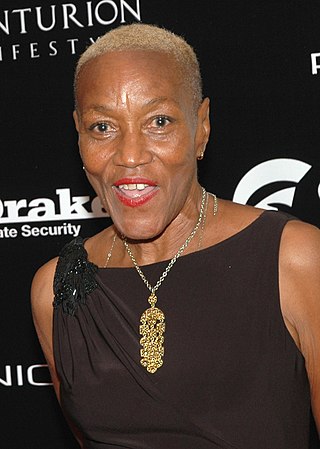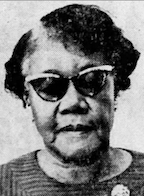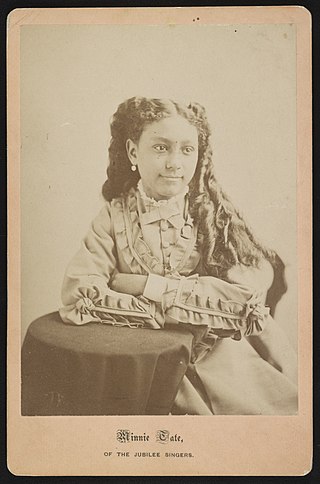Spirituals is a genre of Christian music that is associated with Black Americans, which merged sub-Saharan African cultural heritage with the experiences of being held in bondage in slavery, at first during the transatlantic slave trade and for centuries afterwards, through the domestic slave trade. Spirituals encompass the "sing songs," work songs, and plantation songs that evolved into the blues and gospel songs in church. In the nineteenth century, the word "spirituals" referred to all these subcategories of folk songs. While they were often rooted in biblical stories, they also described the extreme hardships endured by African Americans who were enslaved from the 17th century until the 1860s, the emancipation altering mainly the nature of slavery for many. Many new derivative music genres emerged from the spirituals songcraft.

Gloria Richetta Jones is an American singer and songwriter who first found success in the United Kingdom, being recognized there as "The Queen of Northern Soul". She recorded the 1965 hit song "Tainted Love" and has worked in multiple genres as a Motown songwriter and recording artist, backing vocalist, and as a performer in musicals such as Hair. In the 1970s, she was a keyboardist and vocalist in Marc Bolan's glam rock band T. Rex. She and Bolan were also in a committed romantic relationship and had a son, Rolan Bolan, together.

Ruby Pearl Elzy was an American operatic soprano. She appeared on stage and in films. She recorded on albums before her death in her 30s from surgery to remove a benign tumor.
"Ol' Man River" is a show tune from the 1927 musical Show Boat with music by Jerome Kern and lyrics by Oscar Hammerstein II. The song contrasts the struggles and hardships of African Americans with the endless, uncaring flow of the Mississippi River. It is sung from the point of view of a black stevedore on a showboat, and is the most famous song from the show. The song is meant to be performed in a slow tempo; it is sung complete once in the musical's lengthy first scene by the stevedore "Joe" who travels with the boat, and, in the stage version, is heard four more times in brief reprises. Joe serves as a sort of musical one-man Greek chorus, and the song, when reprised, comments on the action, as if saying, "This has happened, but the river keeps rolling on anyway."
The Five Blind Boys of Mississippi was an American post-war gospel quartet. They started with lead singer Archie Brownlee, their single "Our Father" reached number ten on the Billboard R&B charts in early 1951. Then the screams of their new lead singer Big Henry Johnson captivated audiences all over the world. Jimmy was the heart of the group and the longest standing member. It was one of the first gospel records to do so.

The Blind Boys of Alabama, also billed as The Five Blind Boys of Alabama, and Clarence Fountain and the Blind Boys of Alabama, is an American gospel group. The group was founded in 1939 in Talladega, Alabama, and has featured a changing roster of musicians over its history, the majority of whom are or were vision impaired.
The Fisk Jubilee Singers are an African-American a cappella ensemble, consisting of students at Fisk University. The first group was organized in 1871 to tour and raise funds for college. Their early repertoire consisted mostly of traditional spirituals, but included some songs by Stephen Foster. The original group toured along the Underground Railroad path in the United States, as well as performing in England and Europe. Later 19th-century groups also toured in Europe.

Matilda Sissieretta Joyner Jones was an American soprano. She sometimes was called "The Black Patti" in reference to Italian opera singer Adelina Patti. Jones' repertoire included grand opera, light opera, and popular music. Trained at the Providence Academy of Music and the New England Conservatory of Music, Jones made her New York debut in 1888 at Steinway Hall, and four years later she performed at the White House for President Benjamin Harrison. She sang for four consecutive presidents and the British royal family, and was met with international success. Besides the United States and the West Indies, Jones toured in South America, Australia, India, southern Africa, and Europe.

"Wade in the Water" is an African American jubilee song, a spiritual—in reference to a genre of music "created and first sung by African Americans in slavery." The lyrics to "Wade in the Water" were first co-published in 1901 in New Jubilee Songs as Sung by the Fisk Jubilee Singers by Frederick J. Work and his brother, John Wesley Work Jr., an educator at the historically black college in Nashville, Tennessee, Fisk University. Work Jr. (1871–1925)—who is also known as John Work II—spent thirty years collecting, promoting, and reviving the songcraft of the original Fisk Jubilee Singers, which included being a member and director of the Fisk Jubilee Quartet. The Sunset Four Jubilee Singers made the first commercial recording of "Wade in the Water" in 1925—released by Paramount Records. W. E. B. Du Bois called this genre of songs the Sorrow Songs. "Wade in the Water" is associated with songs of the Underground Railroad.
The Piney Woods Country Life School is a co-educational independent historically African-American boarding school for grades 9–12 in Piney Woods, unincorporated Rankin County, Mississippi. It is 21 miles (34 km) south of Jackson. It is one of four remaining historically African-American boarding schools in the United States. It is currently the largest African-American boarding school, as well as being the second oldest continually operating African-American boarding school. Its campus was listed on the National Register of Historic Places in 2020.
Traditional Black gospel is music that is written to express either personal or a communal belief regarding African American Christian life, as well as to give a Christian alternative to mainstream secular music. It is a form of Christian music and a subgenre of Black gospel music.
The International Sweethearts of Rhythm was the first integrated all-women's band in the United States. During the 1940s the band featured some of the best female musicians of the day. They played swing and jazz on a national circuit that included the Apollo Theater in New York City, the Regal Theater in Chicago, and the Howard Theater in Washington, D.C. After a performance in Chicago in 1943, the Chicago Defender announced the band was "one of the hottest stage shows that ever raised the roof of the theater!" They have been labeled "the most prominent and probably best female aggregation of the Big Band era". During feminist movements of the 1960s and 1970s in America, the International Sweethearts of Rhythm became popular with feminist writers and musicologists who made it their goal to change the discourse on the history of jazz to include both men and women musicians. Flutist Antoinette Handy was one scholar who documented the story of these female musicians of color.
Helen Elizabeth Jones Woods was an American jazz and swing trombone player renowned for her performances with the International Sweethearts of Rhythm. She was inducted into the Omaha Black Music Hall of Fame in 2007.

Laurence Clifton Jones, was the founder and long-time president of Piney Woods Country Life School in Rankin County, Mississippi. A noted educational innovator, Jones spent his adult life supporting the educational advancement of rural African-American students in the segregated South.

Martha Louise Morrow Foxx was an American educator who worked at the Piney Woods Country Life School campus of the Mississippi Blind School for Negroes for forty years, from 1929 to 1969.
The Freedom Singers originated as a quartet formed in 1962 at Albany State College in Albany, Georgia. After folk singer Pete Seeger witnessed the power of their congregational-style of singing, which fused black Baptist a cappella church singing with protest songs and chants, their performances drew aid and support to the Student Nonviolent Coordinating Committee (SNCC) during the emerging civil rights movement. Seeger suggested The Freedom Singers as a touring group to the SNCC executive secretary James Forman as a way to fuel future campaigns. As a result, communal song became essential to empowering and educating audiences about civil rights issues and a powerful social weapon of influence in the fight against Jim Crow segregation. Rutha Mae Harris, a former freedom singer, speculated that without the music force of broad communal singing, the civil rights movement may not have resonated beyond of the struggles of the Jim Crow South.

Ella Sheppard was an American soprano, pianist, composer, and arranger of Negro Spirituals. She was the matriarch of the original Fisk Jubilee Singers of Nashville, Tennessee. She also played the organ and the guitar. Sheppard was a friend and confidante of African-American activists and orators Booker T. Washington and Frederick Douglass.

Minnie Tate was the youngest original member of the Fisk Jubilee Singers, based in Nashville, Tennessee.

Jennie Jackson was an American singer and voice teacher. She was one of the original members of the Fisk Jubilee Singers, an African-American a cappella ensemble. She toured with the group from 1871 to 1877. In 1891 she formed her own sextet, the Jennie Jackson Concert Company.

Grace Morris Allen Jones was an African American educator, school founder, fundraiser, postmaster, clubwoman, reformer, and writer. As well as founding her own vocational training school in Burlington, Iowa, she was instrumental in the success of Piney Woods Country Life School, which she ran with her husband, Laurence C. Jones, in Mississippi.











